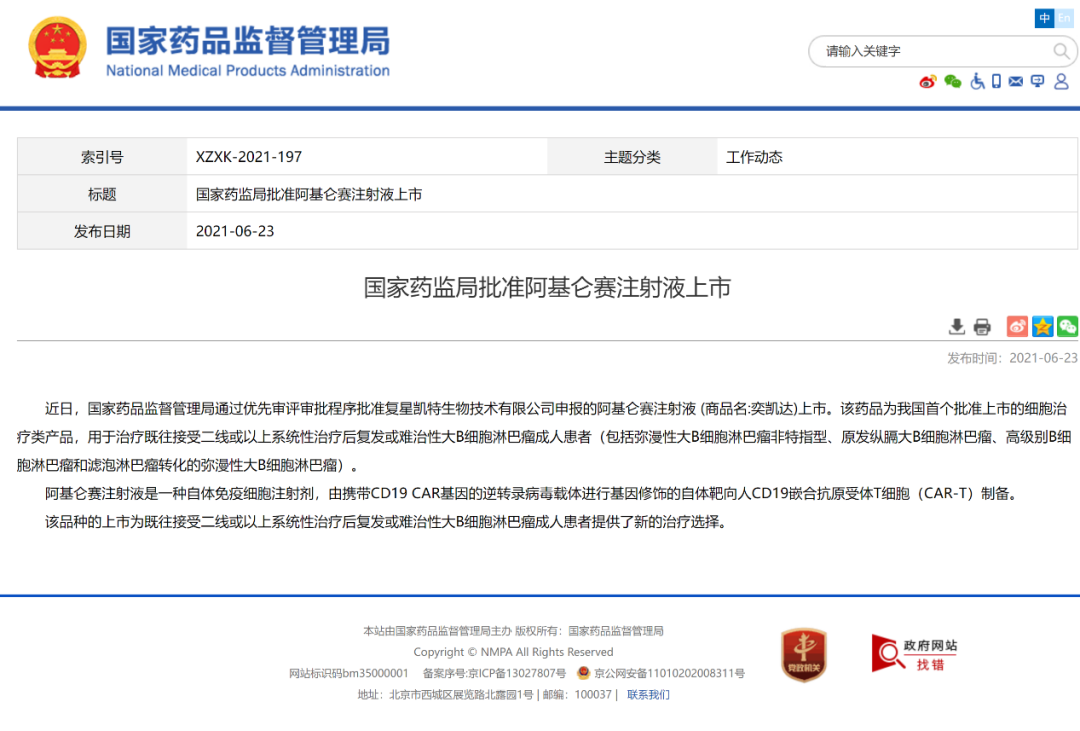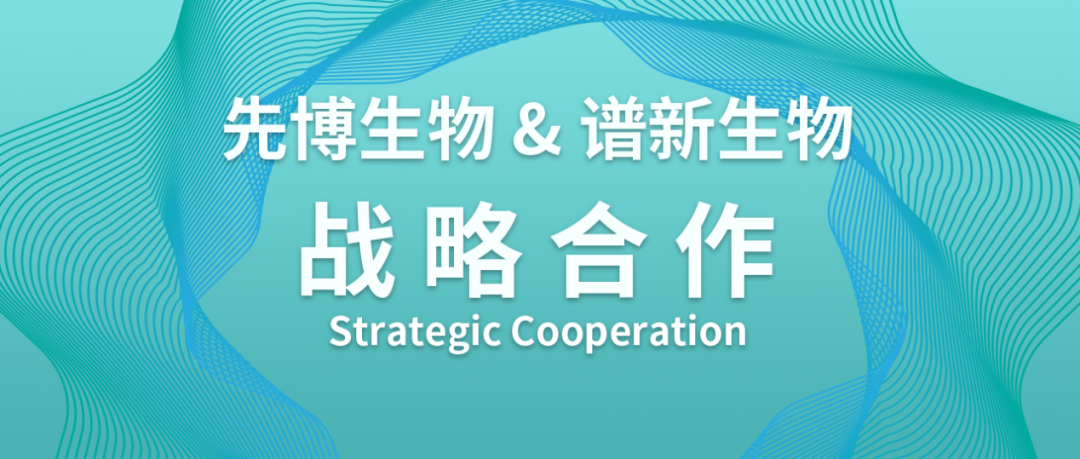It is reported that Shanghai Xianbo Biotechnology Co., Ltd. and Jiangsu Puxin Biopharmaceutical Co., Ltd. have reached a strategic cooperation agreement, entrusting Puxin Bio to carry out the second phase of CAR-T drug registration clinical trials and post-market commercial production. This is the first known commercial production order of cell products under the MAH system in China.
The world's first approved CAR-T drug
On August 31, 2017, Novartis announced that the US FDA has approved its CAR-T therapy for the treatment of B-cell precursor acute lymphoblastic leukemia (ALL) under the trade name Kymriah. The launch of Kymriah is a milestone, marking the official start of the commercialization of "living drugs", which will accelerate the launch of more cell therapy products and benefit cancer patients.

The picture comes from the Internet
CAR-T drug enters the Chinese market for the first time
2021 is known as the first year of commercialization of cell therapy drugs in China.
On June 23, 2021, Fosun Kite's Akirensel injection was approved for marketing in China. This product is the first officially approved CAR-T product in China. It was produced locally by Kite Pharma's Yescarta after technology transfer.
On September 3 of the same year, Innovent Biologics' Rekiorensel injection was approved for marketing in China. This product was independently developed by Innovent Biologics and is the first CAR-T product approved as a Class 1 biologic in China.

The picture comes from the official website of the State Drug Administration
Looking back at the progress of clinical registration of cell therapy drugs in China, as of March 2022, CDE has accepted a total of 135 applications for various types of cell therapy products (starting from the application of Beijing Yongtai's expanded activated lymphocytes for clinical trials, the product has been approved for clinical trials, and the standards for previous acceptance were lower and not included in the statistics). Most of them are investigational new drug (IND) applications (including 8 supplementary applications), and only 3 are marketing applications (currently 2 have been approved). Of these 135 applications, 70 are CAR-T, 25 are other types of immune cell therapy; 31 are MSC, and 9 are other types of precursor cells. Of the 132 clinical applications (including those recently accepted and still under review), a total of 88 have been approved for clinical trials.
The first domestic CAR-T order for Phase II clinical trials and commercialization based on the MAH system
Looking at the commercial production of CAR-T products that have been launched or are about to be launched in China, most of them are self-built by enterprises. With the support of favorable national policies such as the Marketing Authorization Holder (MAH) system, domestic biopharmaceutical companies are also constantly exploring new cooperative development models.

It is reported that Xianbo Bio and Spectrum Bio have reached a strategic cooperation agreement and commissioned Spectrum Bio to carry out the second phase clinical and commercial production of CAR-T drugs. This is the first commercial production order for cell production under the MAH system in China. As a professional and dedicated cell drug CDMO leader, Spectrum Bio has officially opened the door to a new cooperation model in the field of cell drugs.
MAH system and the commercialization of cell drugs
With the development of cell therapy drugs, the high cost and long cycle of R&D, lack of experience in registration and declaration, high degree of product personalization, shortage of technical talents, weak commercial production capacity and other industry problems have been highlighted and urgently need to be solved. At the same time, domestic regulations on cell therapy drugs are mostly industry pilot normative systems such as drafts for comments, and the policy and regulatory level also needs to be improved.
Therefore, for R&D-integrated enterprises, the challenges of technology, management and capital allocation capabilities from product incubation to commercial production are huge. How to continuously improve production quality, control costs, and reasonably allocate investment will become the key issues for enterprises. "Borrowing power" from CDMO enterprises is a good choice, which also optimizes the industrial ecology and promotes long-term sustainable development.
The MAH system separates drug marketing authorization from drug production authorization, resets the "capacity" of all parties in the pharmaceutical market, optimizes resource allocation, and allows professional institutions to do professional things. The development of the MAH system has also spawned a series of professional institutions such as CRO, CMO, CDMO, etc., which are now high-growth tracks in the pharmaceutical industry. In particular, CDMO is a one-stop technical service organization that can provide pharmaceutical companies with services such as pharmaceutical process research and development, optimization, amplification, registration and commercial production of innovative drugs.
The healthy development of the CDMO industry can enable the flexible mobilization and balance of resources in the pharmaceutical industry, promote global drug production and circulation cooperation, enable good drugs to be produced, and promote the "global drug + global sharing" model.
Looking at the international situation, CDMO can assist multinational pharmaceutical companies in the research and production of innovative drugs in their own country, which will greatly help Chinese patients use global innovative drugs as soon as possible.
Looking back at China, the CDMO industry will empower Chinese biotech start-ups. These companies face huge challenges in promoting R&D results and even in the subsequent optimization and commercial production process. Mature CDMO companies can provide one-stop technical business services and global network supply chains, which can not only reduce the R&D and production costs of drugs, but also accelerate the entry of local innovative drugs into the international market.
The CDMO industry will accelerate the construction of the "global innovative drugs + global patient applications" business model, improve the accessibility of drugs and the affordability of ordinary people, and bring benefits to patients around the world.
After the implementation of MAH, the company, as the holder of MAH, shall bear the main responsibility for the non-clinical research, clinical trials, production and operation, post-marketing research, adverse reaction monitoring, reporting and treatment of drugs. Then it is very important to choose a "reliable and professional" trustee. A trustee that focuses on specific product areas, business integrity, ensures continuous compliance, has a professional and high-quality talent team, can effectively speed up the trustee's projects, and has rich industry experience in related fields is undoubtedly the best choice.
"The 21st century is the era of cell therapy," said Nobel Prize winner James Rothman. The era of cell therapy has arrived. In 2022, Spectrum Biopharma, a provider of cell drug solutions, has successively completed financing of more than 100 million yuan.
As Dr. Zhu Yi, CEO of Spectrum Biopharma, said:
Immune cell therapy products represented by CAR-T have achieved industrial success worldwide. China is very likely to become the world's largest cell therapy market in the next 10 years. With the continuous innovation of cell drug varieties, the number of companies and projects involved in development continues to increase, and the demand for professional cell drug CDMO services is also increasing day by day. Spectrum Biopharma is committed to the industrialization of cell drugs, building a healthy and developing industrial ecology, and contributing to the faster and better treatment of patients and getting rid of them.
As the company vision of Spectrum Biopharma: Let cell drugs write a new chapter in life. We look forward to more excellent CDMO companies like Spectrum Biopharma to help the rapid development of the cell drug era, so that more and better cell drugs can reach patients faster, promote global drug sharing, and jointly write a new chapter in the cell drug era!
